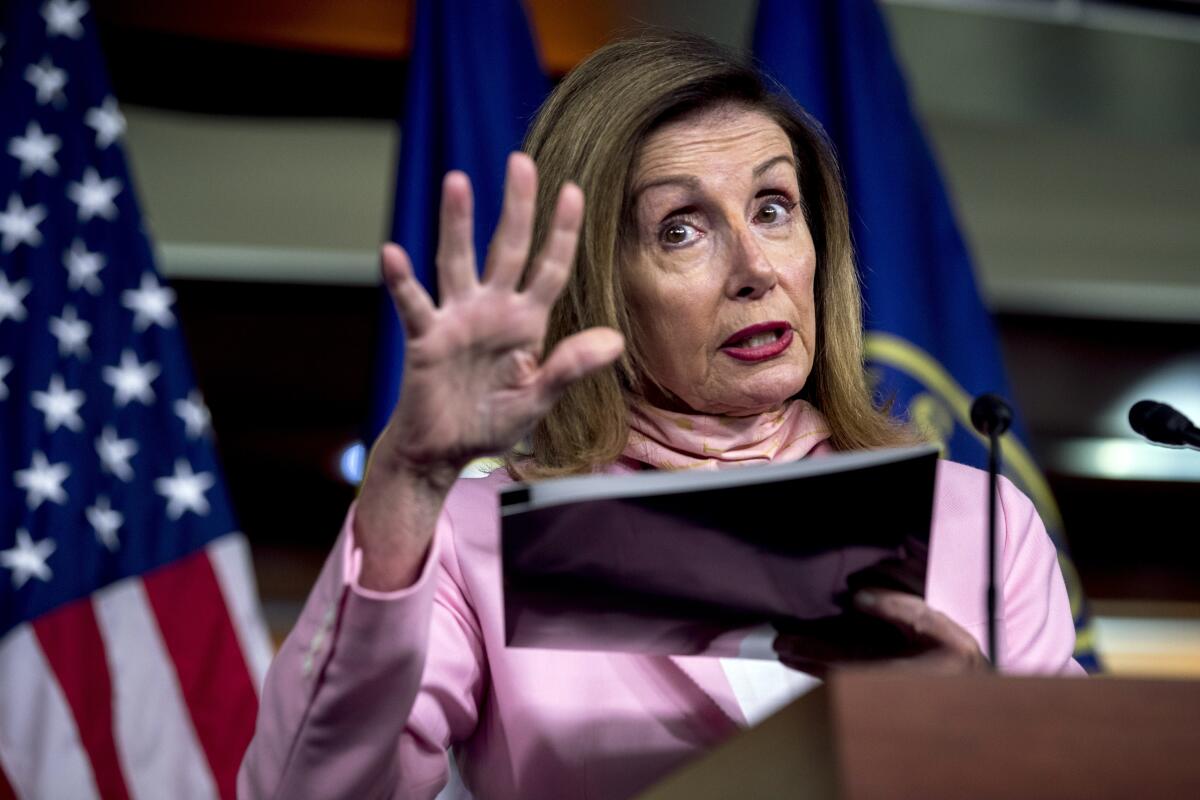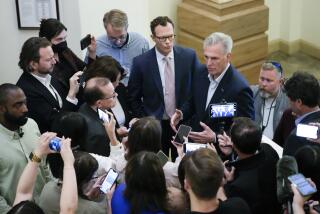Impasse on coronavirus relief bill deepens as benefits run out

WASHINGTON — The $600 federal unemployment subsidy and the national eviction moratorium on some properties expired Friday after Democrats and Republicans failed to reach an agreement on an economic aid package meant to deal with the growing surge of COVID-19.
Congress passed the last major economic package in March, and the Democratic-led House passed legislation that included an extension in May. But serious attempts to negotiate a new deal did not begin until Senate Republicans put forward a counterproposal this week.
That proposal by Senate Majority Leader Mitch McConnell (R-Ky.) was quickly rejected by some in his own party, and President Trump called it “semi-irrelevant.”
Tens of millions of unemployed Americans are relying on the federal aid, which is in addition to state unemployment benefits, to help pay rent, buy groceries and pay other bills during the coronavirus crisis.
The economy contracted by a third between April and June, the swiftest contraction in history, and more than 30 million Americans lost their jobs.
Congress might make the federal unemployment payments retroactive if a deal ultimately is reached, but the delay is expected to cause anxiety and hardship for millions of Americans.
Days of closed-door negotiations between House and Senate Democratic leaders and the Trump administration resulted in frustration and finger-pointing Friday at dueling partisan news conferences with no resolution in sight.
“We weren’t bickering. We were having major policy disagreements,” House Speaker Nancy Pelosi (D-San Francisco) told reporters. “We don’t have shared values; that’s just the way it is. It’s not bickering. It’s standing our ground.”
“The Democrats are certainly willing today to allow some of the American citizens who are struggling the most under this pandemic to go unprotected,” White House Chief of Staff Mark Meadows said in a separate news conference. “The Democrats believe that they have all the cards on their side, and they’re willing to play those cards at the expense of those that are hurting.”
Major differences remain between the House and Senate proposals, including whether to provide more money for SNAP food stamp benefits and to offer help for struggling state governments that have seen tax revenues plummet in the recession.
Other disputes include whether reopened businesses and schools would be protected from liability if customers and employees get infected by the coronavirus, and who should receive another $1,200 direct check from the government.
Even the scope of the bill is up in the air, with Republicans seeking to limit it to $1 trillion and Democrats proposing north of $3 trillion.
Democrats want to keep offering the $600 a week for unemployed Americans through at least the rest of the year. Republicans have proposed extending it for two months at $200 a week, and then limiting it to 70% of an individual’s salary, up to $500.
With chances of a quick compromise dimming, Republicans proposed a short-term extension for some unemployment benefits.
Treasury Secretary Steven T. Mnuchin said after a lengthy meeting Thursday with Pelosi and Senate Democratic leader Charles E. Schumer of New York that he and Meadows had offered several short-term proposals to extend benefits while negotiations continued over a larger, more complex bill, but were rebuffed.
“I think the Democrats are willing to allow the enhanced unemployment to expire; they’ve made that very clear, not once, not twice, but three times, and so I’m not very optimistic on anybody who’s counting on enhanced unemployment to have any relief anytime soon,” he said.
White House Press Secretary Kayleigh McEnany said Democrats didn’t offer counterproposals.
“We’ve made four proposals. The Democrats have made precisely zero,” McEnany said.
Pelosi said that the negotiations are so far apart that a one-week extension wasn’t worthwhile. She has said that a short-term extension would remove leverage while negotiating a complete package.
“What is a one-week extension good for? A one-week extension is good if you have a bill and you’re working it out — the details, the writing of it,” she told reporters Thursday. “It’s worthless unless you are using it for this purpose.”
In most states, including California, the benefits stopped July 25 because most state unemployment systems operate on a weekly basis and couldn’t extend the benefit into the final, partial week of July.
Pelosi, Schumer, Mnuchin and Meadows are expected to continue meeting over the weekend, but it’s unclear whether they’ll begin working on the policy hurdles that remain.
McConnell has indicated that fulsome legislation is possibly weeks away, and he set up a possible vote on a short-term unemployment benefit extension next week if a deal can be reached. The White House on Friday indicated it isn’t ready to move to a large-scale bill, either.
“We have a very specific focus right now, and it’s not this comprehensive plan, whether it be the HEROES Act the Democrats proposed that wasn’t serious, or the HEALS Act,” McEnany said. “That narrow focus is this: that Americans are about to lose their unemployment insurance, and this White House, this chief of staff, this president, this secretary of the Treasury have offered several iterations to make sure that Americans, who through no fault of their own lost their jobs during this pandemic, do not also lose these checks.”
Pelosi said she’s skeptical Republicans are ready to start negotiating a broad package, saying they don’t yet grasp how much will be needed to address the economic problems facing the country.
She noted McConnell’s proposal didn’t include money for SNAP benefits despite long lines at food banks, or money to help states and the U.S. Postal Service conduct voting by mail ahead of the Nov. 3 election.
“The person you’re negotiating with has to want something,” Pelosi said. “You have to think they might want something for the American people. So far, so bad.”
More to Read
Get the L.A. Times Politics newsletter
Deeply reported insights into legislation, politics and policy from Sacramento, Washington and beyond. In your inbox three times per week.
You may occasionally receive promotional content from the Los Angeles Times.












